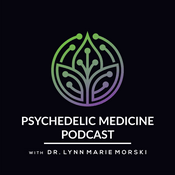In this episode, Dr. Sean M. Viña joins to discuss the ways that social inequality can impact psychedelic healing. Dr. Viña is a sociologist with a PhD from Indiana University whose research focuses on psychedelics and mental health, and social inequality.
In this conversation, Dr. Viña explains that while psychedelics are often framed as transformative treatments, their benefits appear unevenly distributed and frequently constrained by structural factors such as income inequality, education, stigma, caregiving burden, segregation, and social isolation. The discussion highlights how women—particularly single mothers—may experience diminished gains due to caregiving demands and stigmatization of mental illness, while Black and Latino populations show little measurable benefit once socioeconomic inequality is accounted for. Throughout, Dr. Viña emphasizes that outcomes are shaped less by the substances themselves than by the sociocultural environments people return to after treatment, underscoring the importance of community integration and structural supports alongside clinical care.
In this episode, you'll hear:
What inspired Dr. Viña to research social inequality and psychedelics
How caregiving burden, education, and stigma modulate women's mental health outcomes following psychedelic use
Why socioeconomic inequality appears to eliminate measurable benefits for many Black and Latino participants
The role of segregation, policing environments, and chronic stress in shaping treatment outcomes
Why American Indian populations respond better to psychedelic treatments in rural areas with greater access to nature and their culture
How having access to private versus public health insurance can impact psychedelic healing
Why focusing only on therapist–patient interactions may miss key determinants of success
Implications for designing more equitable psychedelic treatments and research
Quotes:
"Women who are highly educated actually seem to be getting about as much benefit [from psychedelic treatments] as men who are highly educated, but [lack of] education doesn't seem to negatively affect men the same way it affects women. Again, that's the pattern we see in all kinds of other health resources." [9:36]
"One of the studies that we did showed that if it wasn't for education and income differences, there would be a slight benefit [from psychedelics] for black participants in these surveys. But as soon as you accounted for education inequality and income inequality, it was wiped out." [21:40]
"I love the concept of the psychedelic renaissance, but when we start thinking about the statistics of who this is helping, this is a renaissance of less than 1% of people, right? This is a very small group of people who are getting benefits, just like many of the other resources that have come out in the past. … all these resources are probably valuable. They're all helpful. But there needs to be more than just the drug. There needs to be a bigger conversation about this society and the community that people are living in." [36:31]
Dr. Viña's academic articles:
"Medical Sociological and Epidemiological Psychedelics Paradigm", Drug Science Policy and Law, 2025
"A Community Centered Approach to Psychedelics", Discover Mental Health, 2025
"Unequal Healing: Gender, Psychedelics, and the Burden of Care", Women and Therapy, 2026
"Psychedelics and Mental Health Treatment Seeking Among Asians and Hawaiians", Psychoactives, 2025
"American Indian areas and psychedelics: A test of the minorities' diminished psychedelic returns", Journal of Rural Mental Health, 2025
"Religious Social Integration, Psychedelics, and Psychological Distress", Journal of Psychoactive Drugs, 2024
"Stigma, Psychedelic Use, and the Risk of Reduced Formal Mental Health Care", Stigma and Health, 2024
With Amanda L. Stephens: "Minorities' Diminished Psychedelic Returns." Drug Science, Policy and Law, 2023
Links:
Dr. Viña on LinkedIn
Dr. Viña on Researchgate
Previous episode: Psychedelics and Religion with Hunt Priest, MDiv
Psychedelic Medicine Association
Porangui



